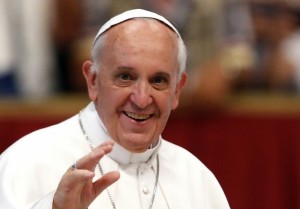
By Sarah Mac Donald - 13 December, 2017
 Twitter followers of the @Pontifex papal account on Tuesday were thanked by Pope Francis for their support and urged to make social media a safe space for humanity.
Twitter followers of the @Pontifex papal account on Tuesday were thanked by Pope Francis for their support and urged to make social media a safe space for humanity.
On the fifth anniversary of the setting up of the Twitter handle, which now has 40 million followers across all nine language versions, Pope Francis tweeted, “Thank you for following @Pontifex which turns five years old today. May social media always be spaces that are rich in humanity!”
It was actually Pope Benedict XVI who posted the first Tweet on the @Pontifex account on 12 December 2012.
That Tweet read: “Dear friends, I am pleased to get in touch with you through Twitter. Thank you for your generous response. I bless all of you from my heart.”
Pope Francis widened the papal social media outreach in March 2016 when he launched an Instagram account (@Franciscus) which now has more than five million followers.
In an interview with Vatican Radio, Archbishop Becciu of the Secretariat of State said Pope Francis considers himself a “digital dinosaur” but nevertheless requests updates about his Twitter output.
He said Pope Francis reads the Tweets that are published by @pontifex and approves them.
“I think the Pope is aware of being an evangeliser and missionary to the world. So for him all instruments may be used. They are tools that can help diffuse his evangelising word,” Archbishop Becciu said.
Meanwhile, in an interview with the Jesuit Post, titled ‘Meet the Man Behind Pope Francis’ Social Media Strategy’, Irish prelate, Bishop Paul Tighe recalled Pope Benedict’s reaction to the proposed launch of the papal Twitter account.
Pope Benedict basically said, “Are you saying this is something that will allow me to reach people I wouldn’t otherwise reach with short messages of hope, and it’s not going to demand a lot of work from me?” “Yes.” “Go with it. I don’t need any further explanation.”
Asked why he believes Pope Francis communicates so well in today’s digital culture, Dubliner Bishop Tighe told the Jesuit Post, “It is extraordinarily fortunate, and it’s not just fortunate, I think it’s providential, that we have a pope whose communication style is very direct and very simple. Very short video clips capture something of the essence of the spontaneity, the good humour, the smile, the simplicity, the generosity.”
“We’re just very blessed in this moment we have somebody who is rather visual in his style of communications. But, I think he would be very disappointed if it didn’t get beyond him to where he’s trying to point people, which is to the Gospel itself.”
“So, one of the things that becomes very clear is that what people see is what they get. I think it’s a reminder for us all to recover a certain authenticity in terms of digital media, that we’re seen to be people who have a concern for the other.”
Discussing social media and the Church’s role, Bishop Tighe said that most people in social media may be trying to sell people something or convert them to a cause.
“We have to be there with a certain gratuity. We’re there as good neighbours. We’re there to listen. We’re there to spend time with people, and if appropriate we also want to share the grounds of our own faith with people, but not as a type of bombarding or trying to, but actually authentically to say, ‘Well look, the reason I can draw hope is because I have this privileged sense of being loved by God.’”
He also warned Catholics that their social media engagement, particularly in the English-speaking world, sometimes risked being too focused on their own internal debates.
“Let’s say you came across this and you weren’t a believer. Is it something that you would find immediately life enhancing? Would you say, ‘Oh, I really would want to join that group’?”
“So, I think the other thing that we need to think more about is how, without being glib about it or superficial about it, do we find a way to offer witness to our faith that would be life-giving and supportive to other people.”
“In our part of the world it’s not quite cool to be too overt about the faith. But I think that the challenge for us, even then, is to somehow find a way of responding to things that shows a certain sort of tolerance and a certain understanding that people might ask, ‘Well, what’s the source of your hope?’”
“What we want to come across is a desire to support people rather than necessarily a desire to somehow sign them up for our cause.”
“I want to encourage lay people and Catholics generally to stay involved in social media. You could say it’s a negative environment, there’s a lot of nasty comment, a lot of rough dealings with people. But then we’d abandon that field and let the trolls have it.”